What Does English Breakfast Tea Taste Like
English Breakfast Tea is a traditional blend of black teas originating from Assam, Ceylon, and Kenya. It is one of the most popular blended teas, well-known for its robust, rich, and full-bodied flavor. The blend creates a satisfying balance of sweetness and astringency, making it a perfect start to your day.
Taste Profile:
- Strength: Strong
- Flavor: Malty, with hints of toasted leaves
- Aroma: Fresh and invigorating
The liquor of the brew presents a deep amber color. You'll notice that English Breakfast Tea has a hearty aroma that complements its bold flavor profile. On your palate, you’ll experience a malty taste characteristic of Assam, combined with the refreshing and subtle floral notes from Ceylon, and a briskness contributed by Kenyan teas.
Bestsellers
- Water Temperature: 96-100°C (205-212°F)
- Steeping Time: 3-5 minutes
- Best Enjoyed with a splash of milk or a slice of lemon
English Breakfast Tea is often associated with a traditional English breakfast, hence its name. The high caffeine content makes it a common morning beverage, providing an energy boost to kick-start the day. It’s versatile and can be drunk plain, but it also holds up well to milk and sugar, catering to a variety of taste preferences.
Flavor Profile
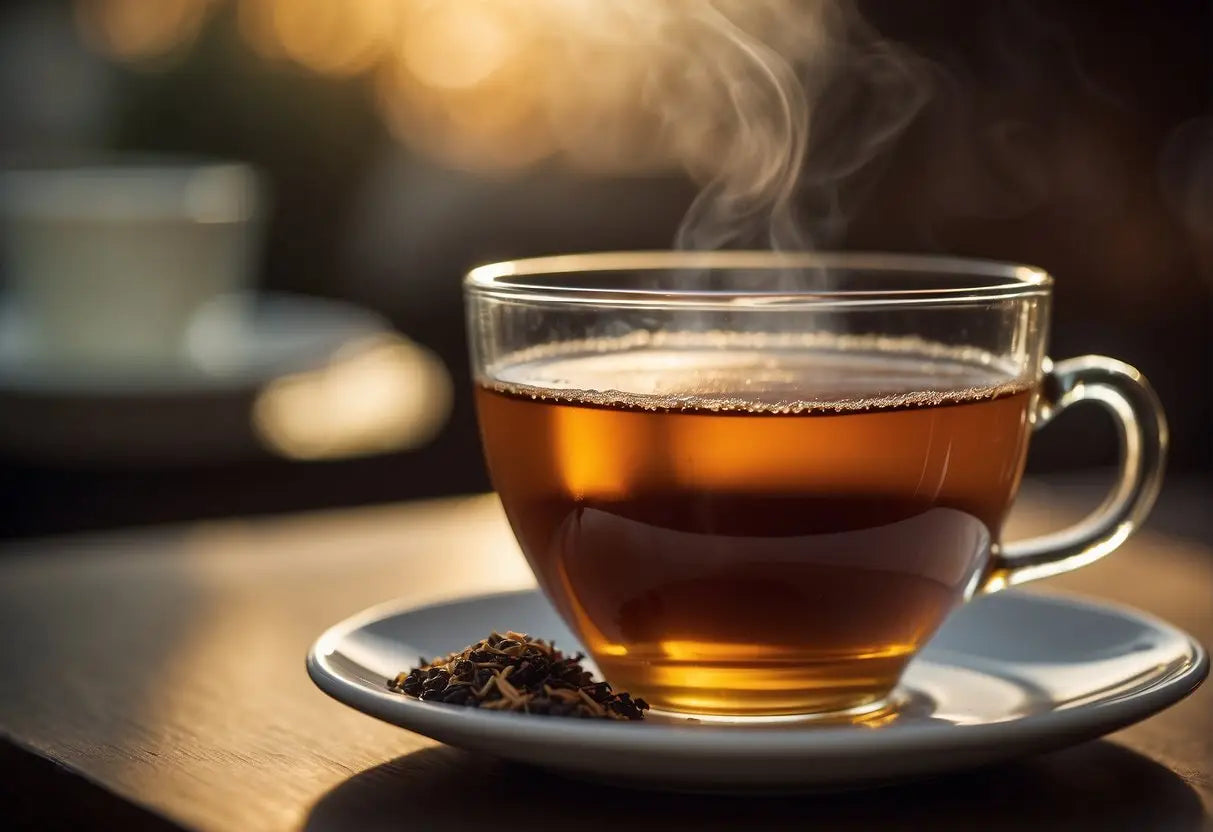
English Breakfast tea offers a rich and full-bodied experience characterized by its taste and aromatic complexity.
Primary Tastes
- Sweetness: You will generally perceive a subtle natural sweetness.
- Bitterness: There's a noticeable bitter edge, especially if brewed for longer periods.
- Astringency: A hint of astringency may give a dry mouthfeel.
Aromatic Notes
- Malty: A robust malty aroma often prevails, reminiscent of toasted grains.
- Earthy: You may detect earthy undertones that ground the tea's flavor profile.
- Floral & Citrus: Light floral or citrus notes can sometimes emerge, adding a refreshing dimension.
Brewing Technique
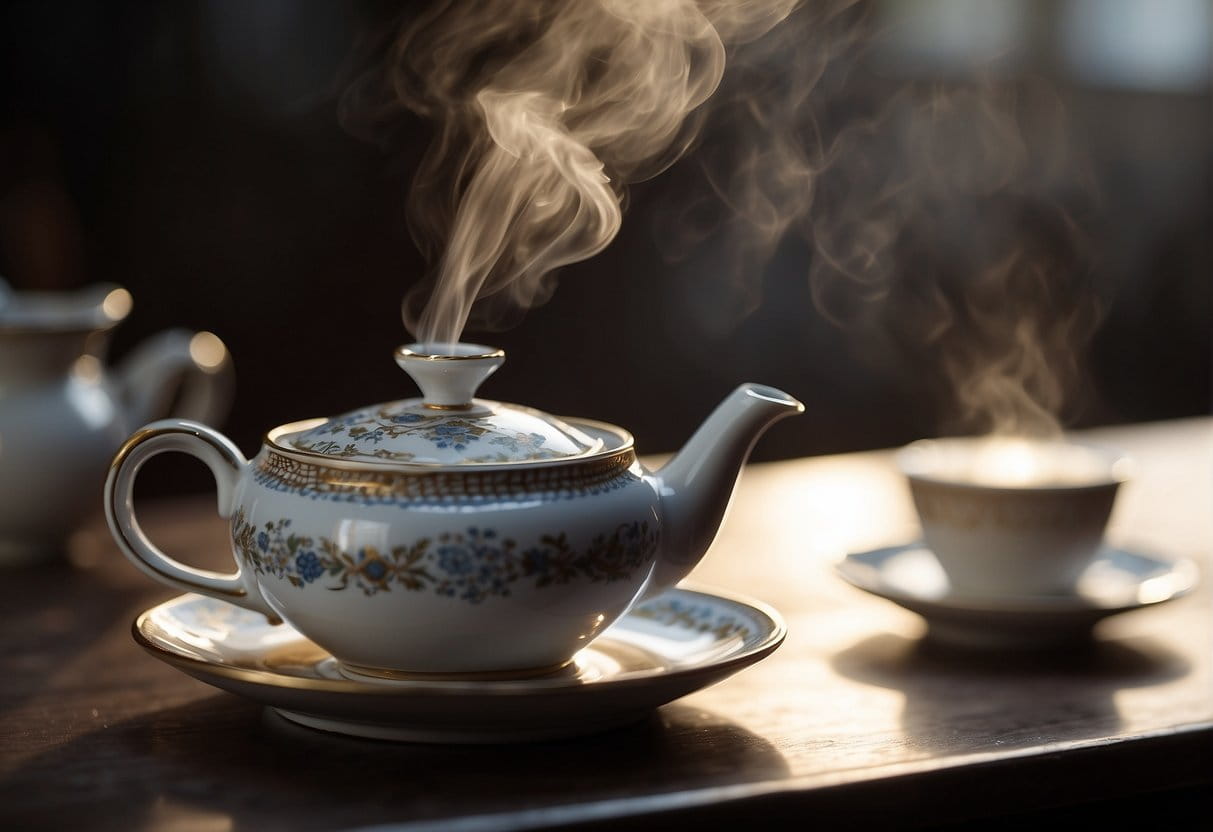
The proper brewing technique is vital to fully experience the robust and nuanced flavors of English Breakfast tea.
Water Temperature
For optimal taste, your water should be close to boiling at 212°F (100°C). Using water that is too cool will result in a weak extraction, while excessively hot water can damage the delicate tea leaves.
Steeping Time
Steep your English Breakfast tea for 3-5 minutes. A shorter steeping time yields a lighter, less bitter flavor, while a longer time allows for a stronger brew but risks developing an overly bitter taste.
- 3 minutes: Mild flavor
- 4 minutes: Medium strength
- 5 minutes: Bold, full-bodied flavor
Tea Leaves Origin
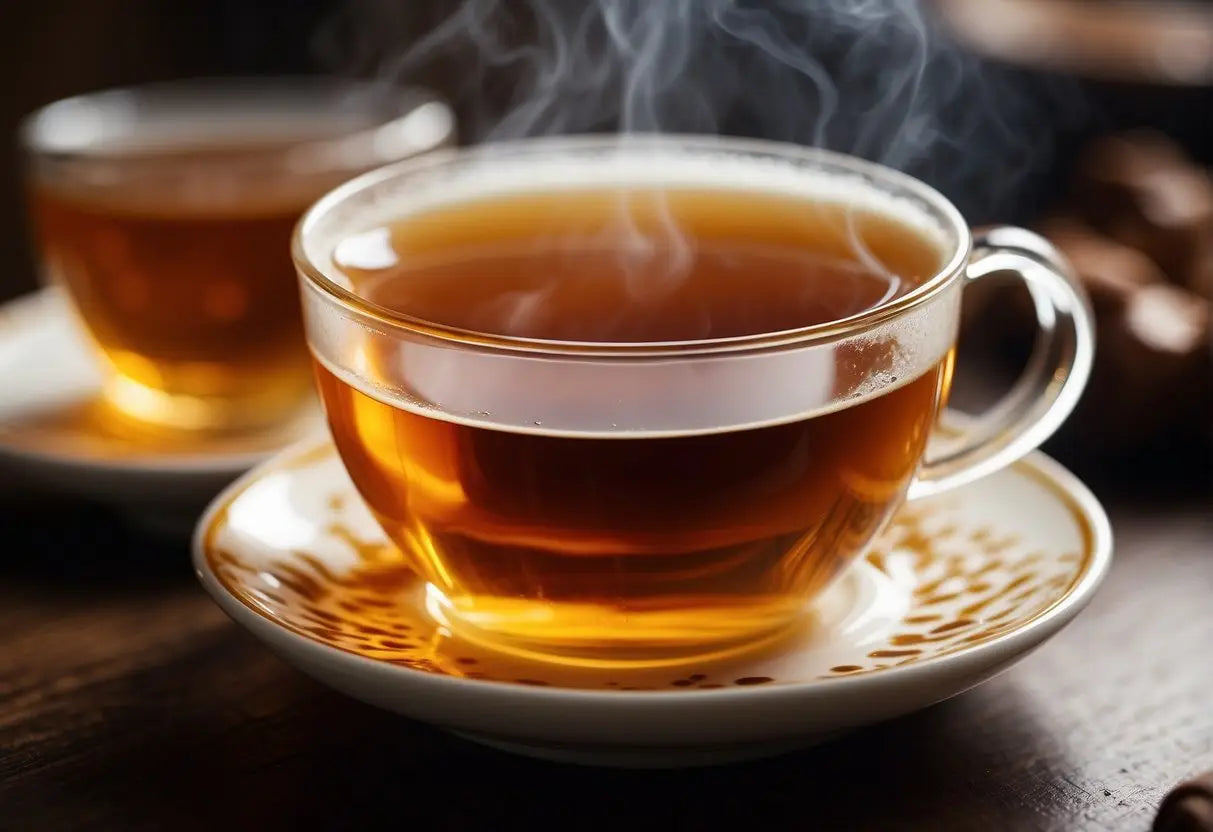
When you sip your English Breakfast tea, you're experiencing a blend of tea leaves typically sourced from various regions. Primarily, these regions include Assam in India, Ceylon in Sri Lanka, and Kenya in Africa. Each region contributes unique characteristics to the flavor profile of the tea.
-
Assam: Located in northeastern India, this region is known for its robust and malty teas. The tropical climate and heavy rainfall create ideal conditions for growing tea. Assam teas contribute a full-bodied richness to English Breakfast blends.
-
Ceylon: Sri Lankan teas, formerly known by their colonial name, Ceylon, add zest and brightness. The high elevations and diverse climate conditions across different parts of the island result in a variety of flavor profiles, ranging from bold and rich to clean and fresh.
Lao Ban Zhang
-
Kenya: Kenyan teas are valued for their deep color and briskness, thanks to the fertile volcanic soil and equatorial climate. Kenya's teas bring an assertive strength and brightness to the blend.
Each region's tea leaves are processed in a similar manner, including withering, rolling, oxidizing, and drying, which ensures a consistent product suitable for blending. When combined, these diverse tea sources contribute to the complex flavor profile that characterizes your English Breakfast tea.
Caffeine Content
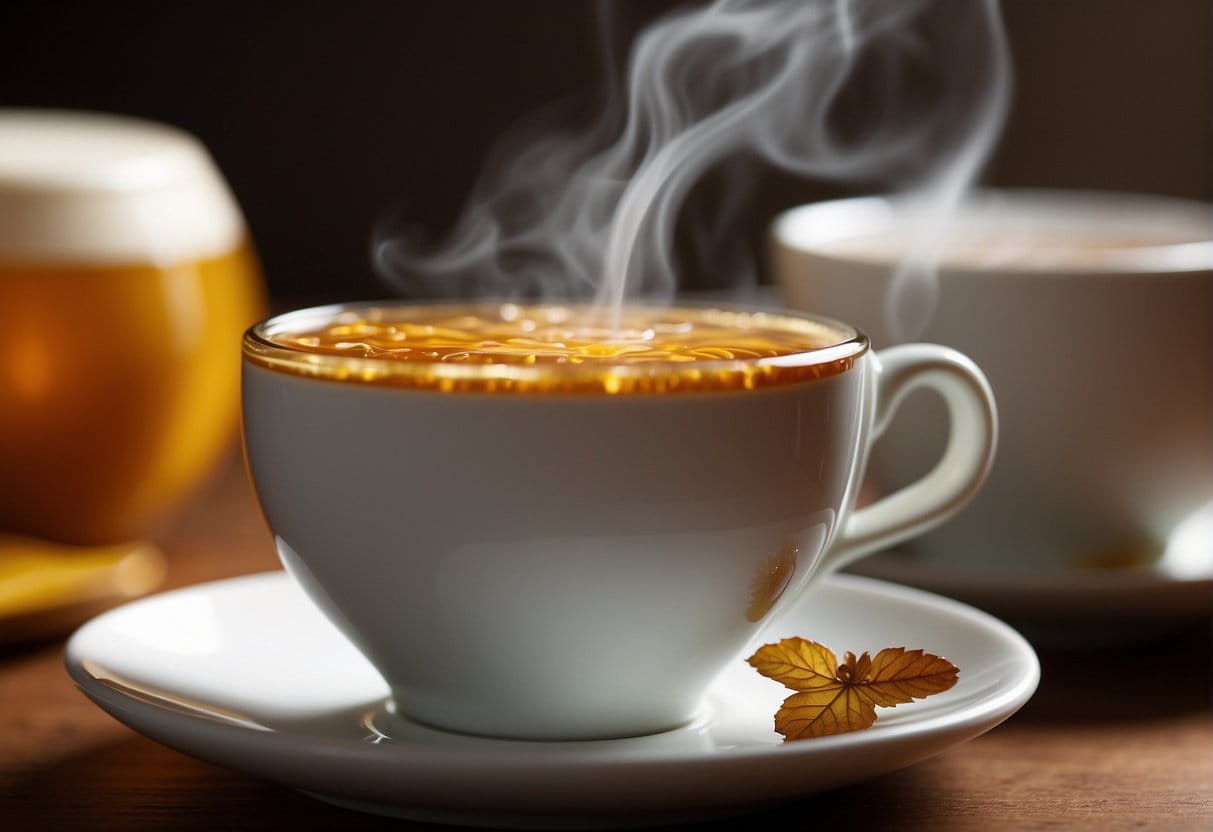
When you sip on a cup of English breakfast tea, you're consuming caffeine, a natural stimulant found in tea leaves. Typically, a standard 8-ounce (240-milliliter) cup contains between 40 to 70 milligrams of caffeine, though this can vary depending on brewing time and the amount of tea used.
To put this into perspective, here's how English breakfast tea compares to other common beverages:
| Beverage | Caffeine Content (per 8 oz) |
|---|---|
| English Breakfast Tea | 40-70 mg |
| Coffee | 80-100 mg |
| Green Tea | 15-45 mg |
| Herbal Tea | 0 mg |
Your caffeine intake from English breakfast tea can be moderated by adjusting brewing times—shorter for less caffeine, longer for more—or by the amount of tea leaves used. It's important to consider your own sensitivity to caffeine and any dietary recommendations provided by health professionals.
Remember, the caffeine in English breakfast tea can help you stay alert and focused, but it's advisable to limit your intake if you are sensitive to caffeine or have been advised to do so by a healthcare provider.
Health Benefits
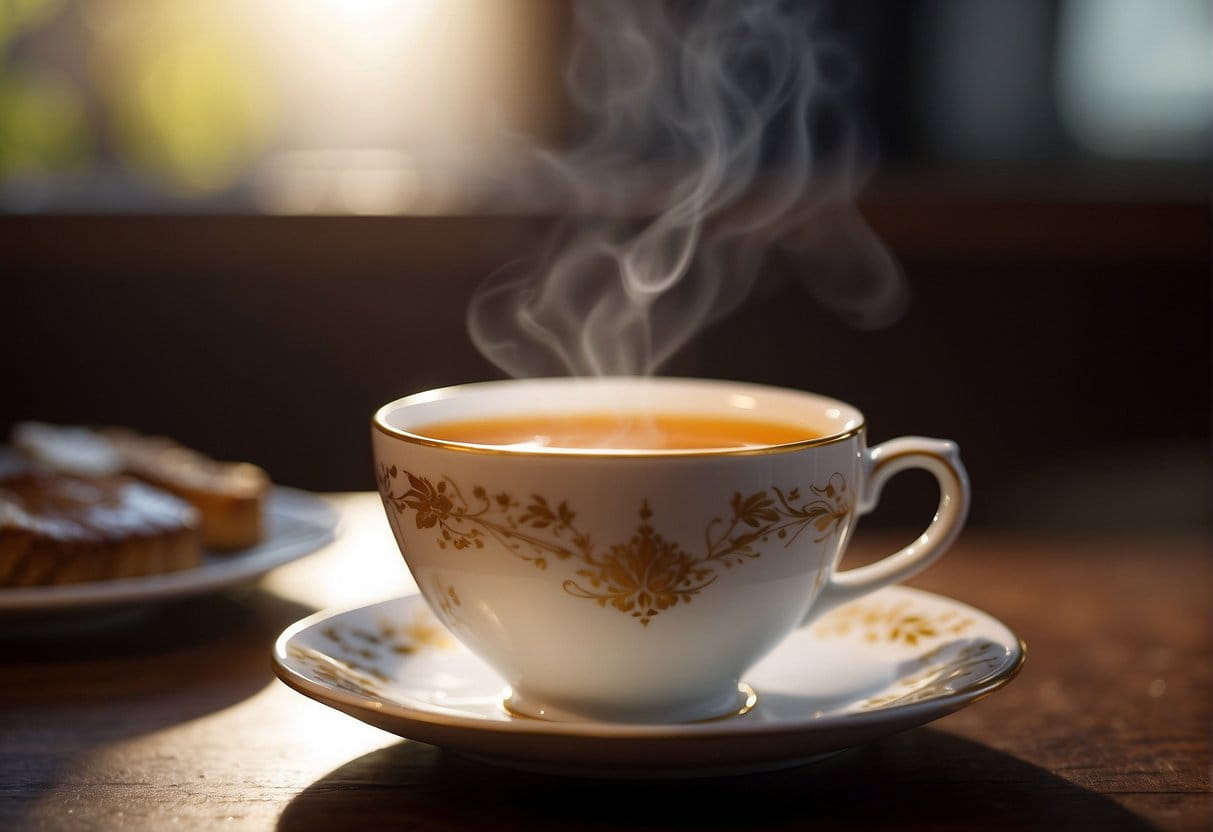
When you drink English breakfast tea, you're not only enjoying a robust flavor but also tapping into a source of beneficial compounds. The primary advantage comes from the antioxidants present in black tea leaves, which are known for their potential to combat oxidative stress and support heart health.
- Antioxidants: These include flavonoids such as theaflavins and thearubigins.
- Heart health: Regular consumption might be linked to a reduced risk of heart disease.
In addition to its heart benefits, English breakfast tea may contribute to your overall well-being in various ways:
- Mental alertness: The caffeine content can help sharpen your focus.
- Digestive aid: It can be a comforting ritual for your morning routine.
While these benefits are promising:
- Moderation is key: Limit intake to avoid excessive caffeine consumption.
- Consult with a professional: If you have any health concerns.
Remember, English breakfast tea can be part of a healthy diet, but it's not a cure-all. Enjoy it as one of the many choices you make each day for your health.
Common Pairings
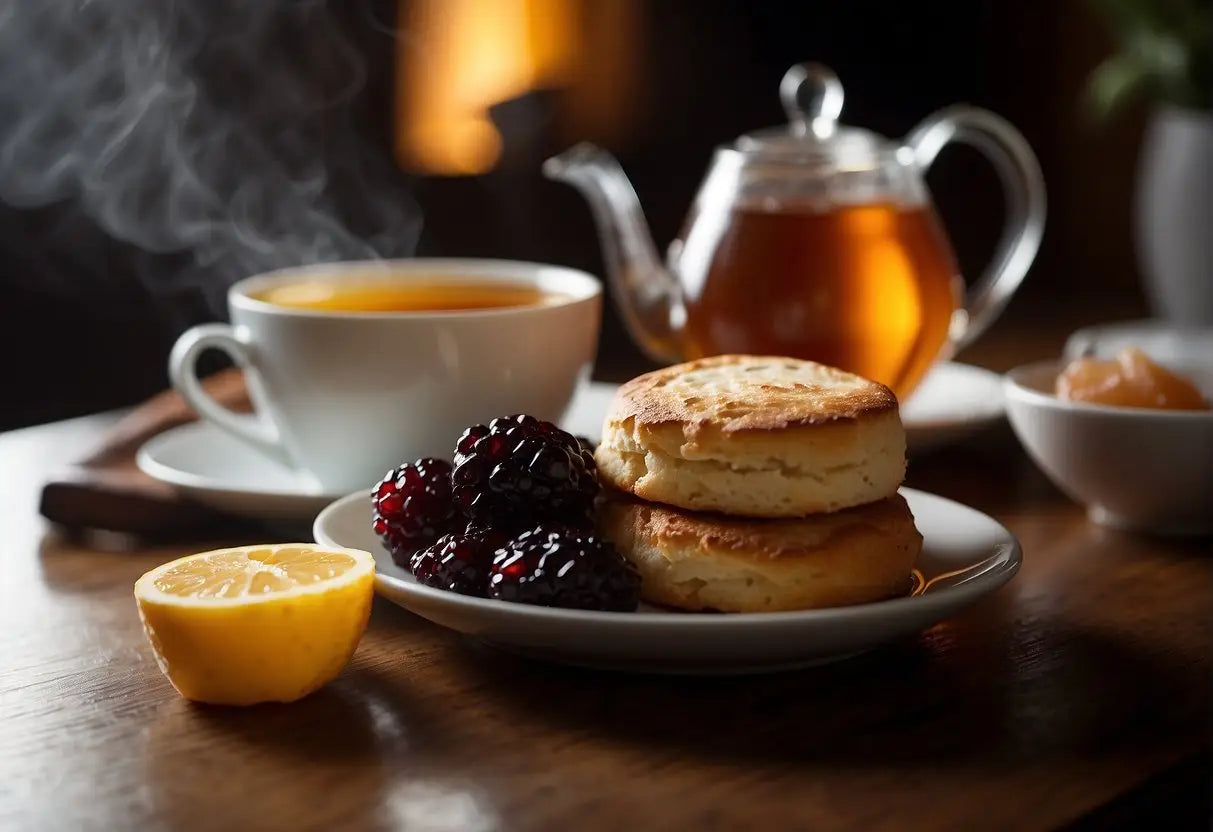
When enjoying your English Breakfast tea, consider pairing it with foods that complement its robust flavor. Your tea can be taken plain, but it also stands up well against hearty breakfast items. For a classic experience, try these pairs:
- Pastries: A croissant or scone balances the strength of the tea.
- Breads: Toast with butter or jam; the simplicity highlights the tea's richness.
- Eggs: Whether scrambled, boiled, or poached, eggs are a traditional accompaniment.
- Meats: Savory options like bacon or sausage link the tea's boldness with rich flavors.
- Fruits: For a refreshing contrast, pair with citrus fruits like oranges or grapefruit.
| Pairing | Description | Why It Works |
|---|---|---|
| Pastries | Light, flaky, and sweet or neutral | Balances tea's strength |
| Breads | Simple with a touch of sweetness or savoriness | Complements tea's richness |
| Eggs | Versatile and fulfilling | Matches the tea's heartiness |
| Meats | Rich and savory | Enhances the tea's boldness |
| Fruits | Fresh and tangy | Offers a refreshing contrast |
Remember, the right food pairing can turn your English Breakfast tea time into a delightful experience. You’re encouraged to explore these combinations to find your perfect match.
Variations and Blends
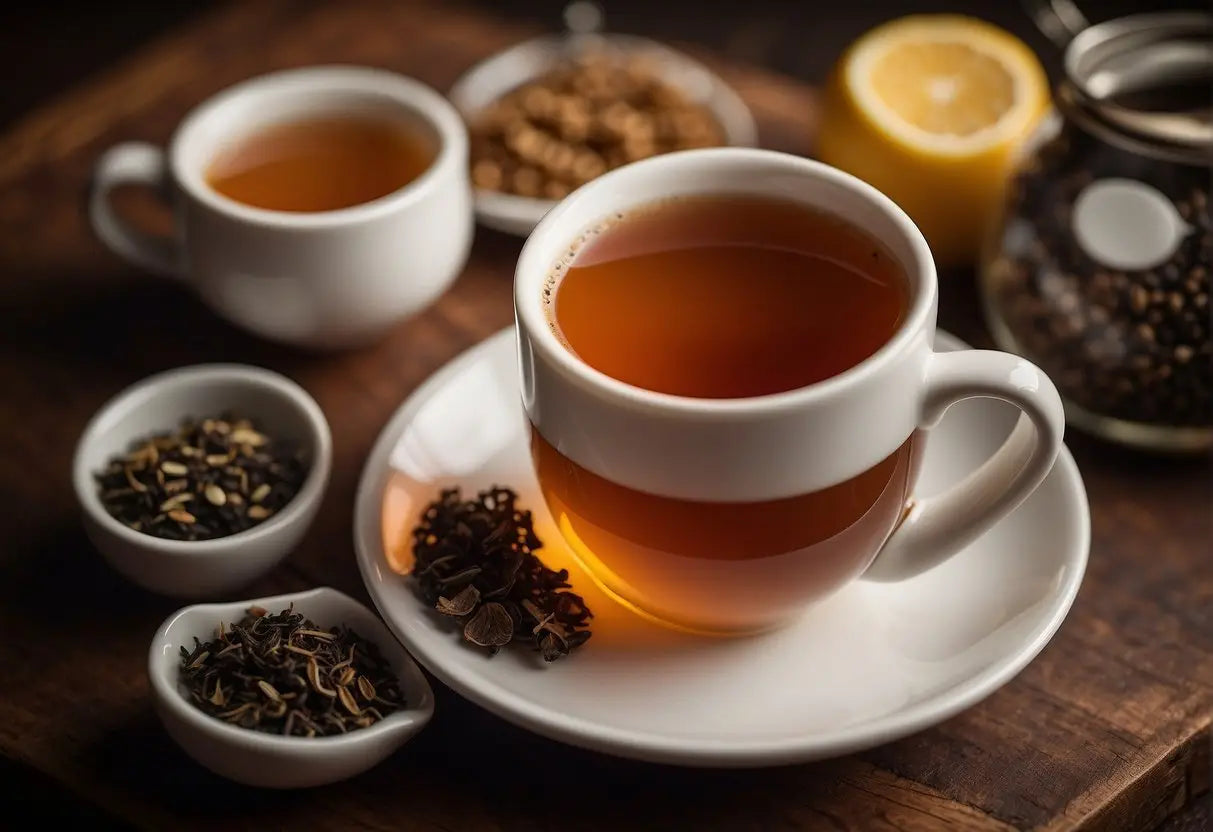
English Breakfast tea comes in various blends and variations that cater to a range of taste preferences. Classic English Breakfast is a robust blend of black teas, typically including Assam, Ceylon, and Kenyan leaves, known for its strong, full-bodied flavor and rich color.
Some common variations include:
- Irish Breakfast: This blend has a higher proportion of Assam teas, which gives it a more malty flavor and a stronger brew.
- Scottish Breakfast: Often includes a blend of Assam, Ceylon, and Chinese teas, resulting in a stronger and more assertive taste compared to the classic blend.
Blends and brands might add their unique twist to these teas. For example, some may incorporate:
| Ingredient | Description |
|---|---|
| Keemun | A Chinese black tea that adds a slightly smoky and richly aromatic nuance. |
| Darjeeling | Sometimes included for its floral notes and a lighter, brisk flavor. |
In your exploration of English Breakfast teas, you may encounter variations labeled as:
- Decaffeinated: Offers the full flavor of English Breakfast without the caffeine.
- Organic: Made from leaves grown without synthetic pesticides or fertilizers.
- Flavored: Complemented with additional flavors such as bergamot to create an Earl Grey Breakfast blend.
When selecting your blend, consider your flavor preferences. Do you enjoy a strong, hearty tea that stands up well to milk and sugar, or do you prefer a lighter touch with subtle complexity? Your choice can determine the character and enjoyment of your tea experience.
Frequently Asked Questions
In this section, you'll find concise responses to common inquiries regarding the taste profile and characteristics of English Breakfast tea.
What are the typical flavors one can expect from English Breakfast tea?
You can expect a robust, full-bodied flavor with a rich and malty taste. There may also be subtle notes of citrus and astringency, which are characteristics of the Assam, Ceylon, and Kenyan teas often used in the blend.
How does the taste of English Breakfast tea change when milk is added?
When you add milk to English Breakfast tea, the texture becomes creamier and the taste mellows. The bitterness and astringency decrease, while the malty and sweet notes become more prominent.
What distinguishes English Breakfast tea from Earl Grey?
English Breakfast tea is a blend of several black teas, typically including Assam, Ceylon, and Kenyan varieties, and is known for its strong, rich taste. Earl Grey, on the other hand, is a flavored tea that is generally made from black tea infused with the oil of bergamot, giving it a distinctive citrusy flavor.
Can you describe the difference between English Breakfast tea and other black teas?
English Breakfast tea is a carefully crafted blend designed to deliver a balanced, full-bodied flavor with a strength suitable for pairing with breakfast foods. Other black teas, such as Darjeeling, have a lighter, more delicate taste and are less malty.
What health benefits are associated with drinking English Breakfast tea?
Drinking English Breakfast tea provides antioxidants like flavonoids, which can help combat free radical damage. Regular consumption can support heart health and may also aid in improving alertness and focus due to its caffeine content.
Does English Breakfast tea contain caffeine, and if so, how much?
Yes, English Breakfast tea contains caffeine. A typical 8 oz cup contains around 40-70 mg of caffeine, depending on how long it's brewed. This is less than coffee but enough to provide a gentle, sustained boost of energy.
← Older post Newer post →











